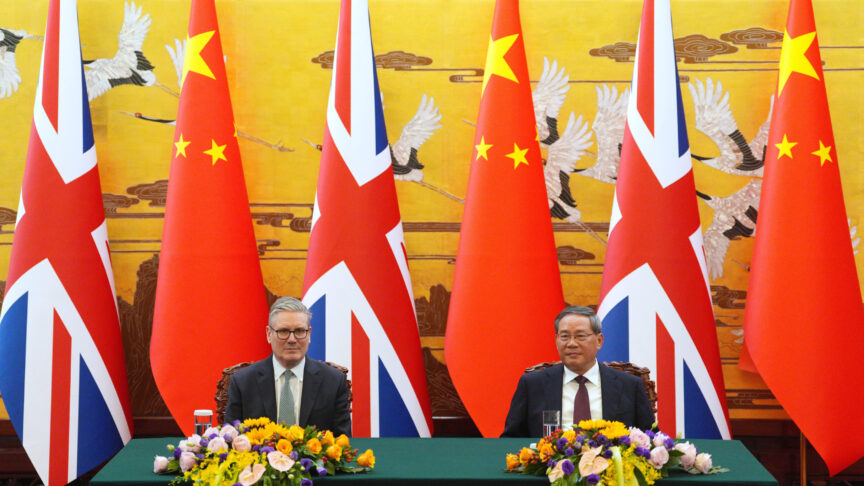Russia showed Turkey and China how to bully the EU
The more meekly the EU handles other powers’ aggressive tactics, the more they will be tempted to imitate each other in novel ways to ignore, challenge, and openly attack European interests.
Covid-19 has slowed down the global economy, but not the world’s descent into ever more brutish ways to conduct international politics. The European Union seems determined to speak “the language of power” in principle, but it is still shy about doing it in practice.
In spring, China’s international outreach switched remarkably quickly from self-advertising “mask diplomacy” to “wolf warrior diplomacy”, shedding decades of low-key diplomatic practices.
Turkey deployed troops and sent arms to Libya to support the internationally recognised government (but broke an international arms embargo). Turkish ships managed to engage in threatening manoeuvres against a French ship that was part of a NATO naval mission around Libya.
Failing to elicit strong enough NATO support, an indignant French government suspended its participation in the NATO naval mission. Russia deployed aeroplanes to Libya to support a warlord, but somehow got away with less international opprobrium than Turkey. None of these practices is new. In the last decade or so, Russia has excelled at such behaviour. What is newer is that plenty of other powers seem to be singing from the Russian hymn sheet. The previously dull public diplomacy of the Chinese ministry of foreign affairs is adopting the cocky tone of its Russian counterpart.
Turkey’s intervention into Libya is not unlike the Russian intervention in Syria (but with a much smaller civilian death toll, for now). Turkey’s control of large swathes of territory in northern Syria is reminiscent not just of decades-long Turkish control of Northern Cyprus, but also of Russia’s control of several “conflict zones” such as Abkhazia and South Ossetia in Georgia, Transnistria in Moldova, and Donbas in Ukraine. A similar prospect of a partition frozen in time might await Libya, with various parts of the country being supported by external powers for decades to come.
To a degree, Russia is not responsible for the fact that other states have increasingly adopted the Russian blueprint for geopolitical skirmishes with either the EU or the United States. However, by pushing the limits of the internationally acceptable with such apparent ease, Moscow made such behaviour increasingly appealing to other powers as well. The West’s usually meek reactions to Russia’s diplomatic, cyber, propaganda, and intelligence skirmishes has taught everyone willing to challenge the US or bully Europe to not be too shy.
The EU’s approach to Russia, Turkey, and its eastern and southern neighbourhoods remains mostly un-geopolitical.
Take cyber attacks: since the late 1980s, if not earlier, great powers have mostly used cyber intrusions for spying. In the last decade, Russia has pioneered cyber attacks on critical civilian infrastructure such as power grids in ways that neither China nor the US did before (the Stuxnet virus, allegedly developed by the US, targeted Iranian nuclear centrifuges, not civilian electricity supplies in Iran, for example).
Soon enough, the number of attacks against civilian critical infrastructure started to increase. Even NATO member states – including the US, the United Kingdom, France, and the Netherlands – started adapting their cyber security doctrines to an ever more aggressive cyber world. Attempts to influence elections tell a similar story.
Russia’s first troll farms, sometimes called “web brigades”, date from the mid-2000s and were initially used in domestic politics. Now, several dozen states conduct equally aggressive domestic trolling operations. Russia was the first to internationalise such operations on a massive scale, by attempting to influence the 2016 US and 2017 French presidential elections.
In 2020 many more states are in the game – Iran, China, Turkey, and Israel among them. As plenty of powers are increasingly pushing the limits of the permissible and unpunishable, it is the EU and the US that allow these limits to be pushed.
The more meekly the US and especially the EU handle such aggressive tactics, the more other powers will be tempted to imitate each other in novel ways to ignore, challenge, and openly attack EU and US interests.
On some theoretical levels, European leaders seem to get it. Their language on China and Turkey has toughened. European sanctions on Russia have not faltered. There is talk of making the EU more geopolitical, and more strategically sovereign at the same time. But this theoretical realisation of new geopolitical realities has yet to turn into concrete policies. The EU’s approach to Russia, Turkey, and its eastern and southern neighbourhoods remains mostly un-geopolitical.
The coronavirus-induced economic crisis might cause defence spending to decrease rather than continue its gradual rise. Even though the EU adopted a legal framework that allows for the introduction of sanctions against the (presumably identified and state-sponsored) perpetrators of cyber attacks, it has never used them.
The EU is nowhere near geopolitical relevance in either Syria or Libya. Out of concern about irritating Russia, the EU is still afraid of its own shadow when it comes developing security (let alone defence) cooperation with countries such as Ukraine and Georgia. As long as the EU’s concrete policies remain so far behind its declared desire to speak the language of power, geopolitical disregard – sometimes verging on bullying – of the bloc is likely to spread further.
This article first appeared in EUObserver.
The European Council on Foreign Relations does not take collective positions. ECFR publications only represent the views of their individual authors.


